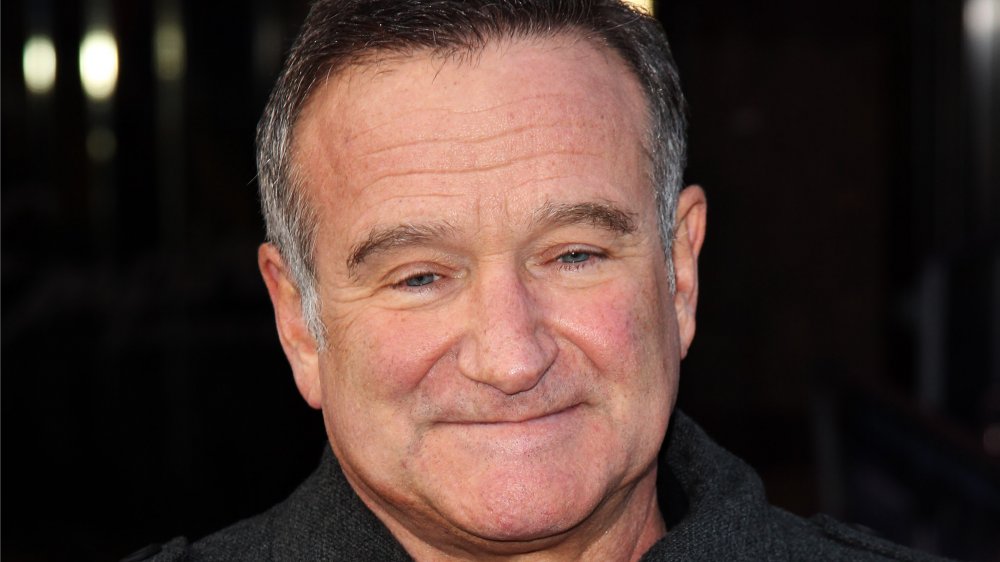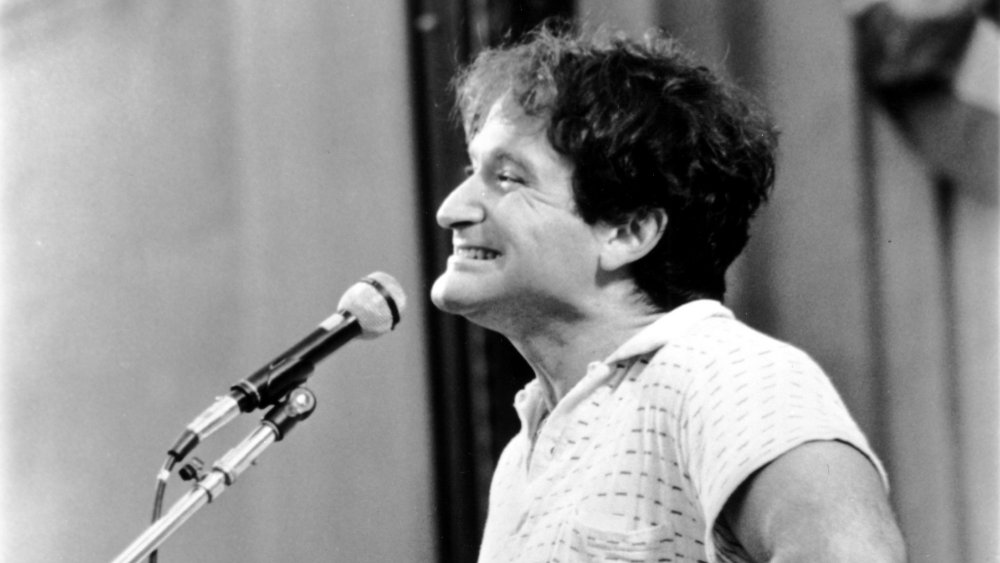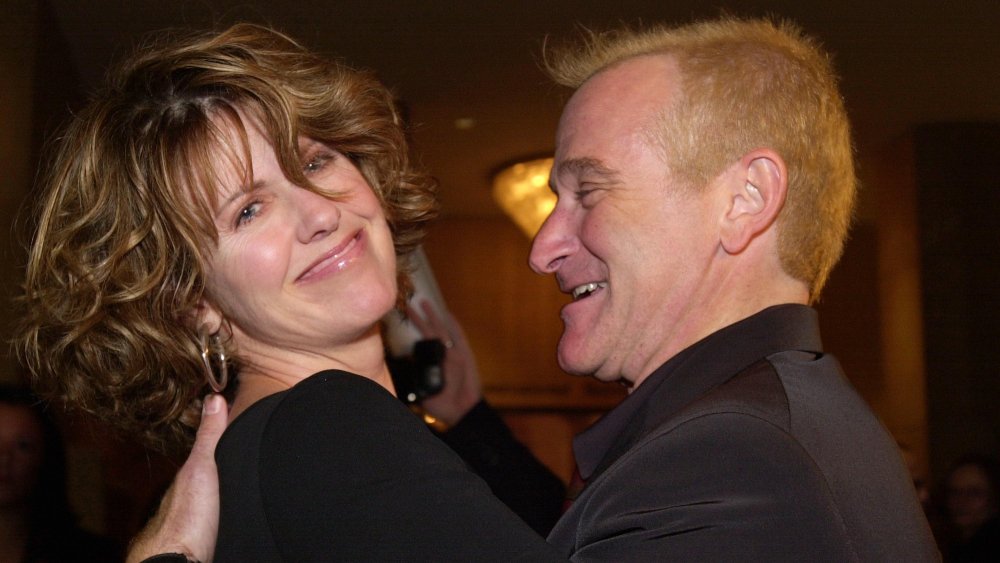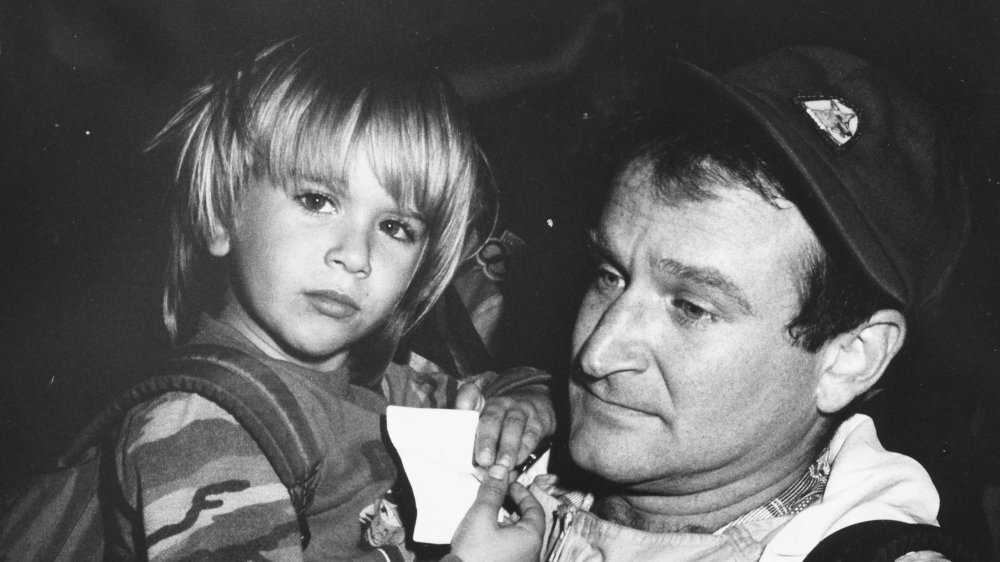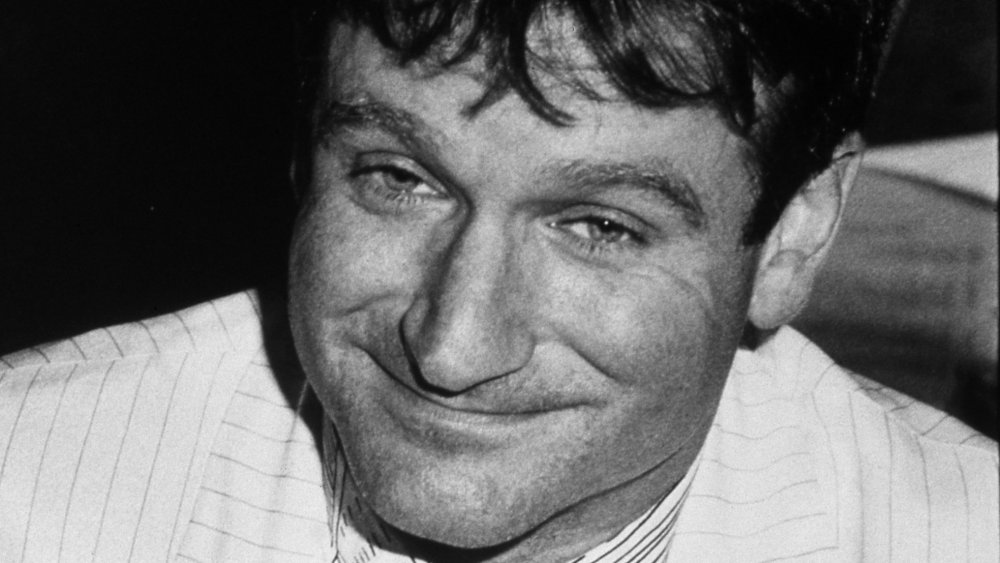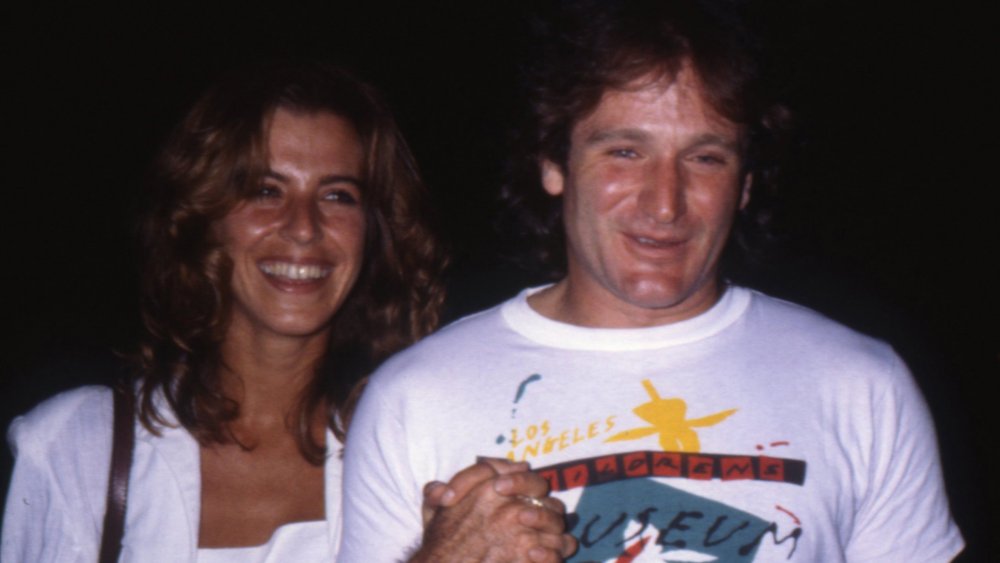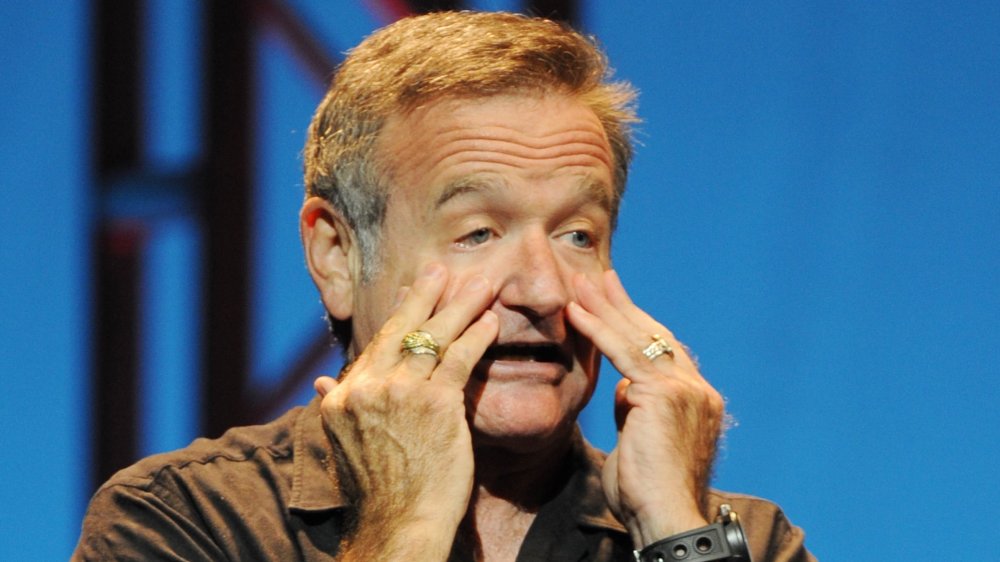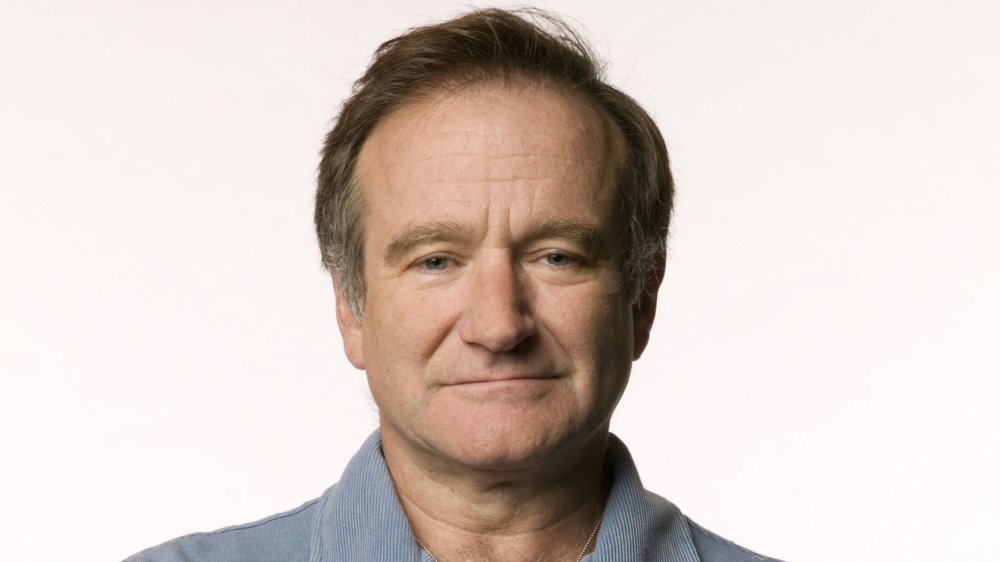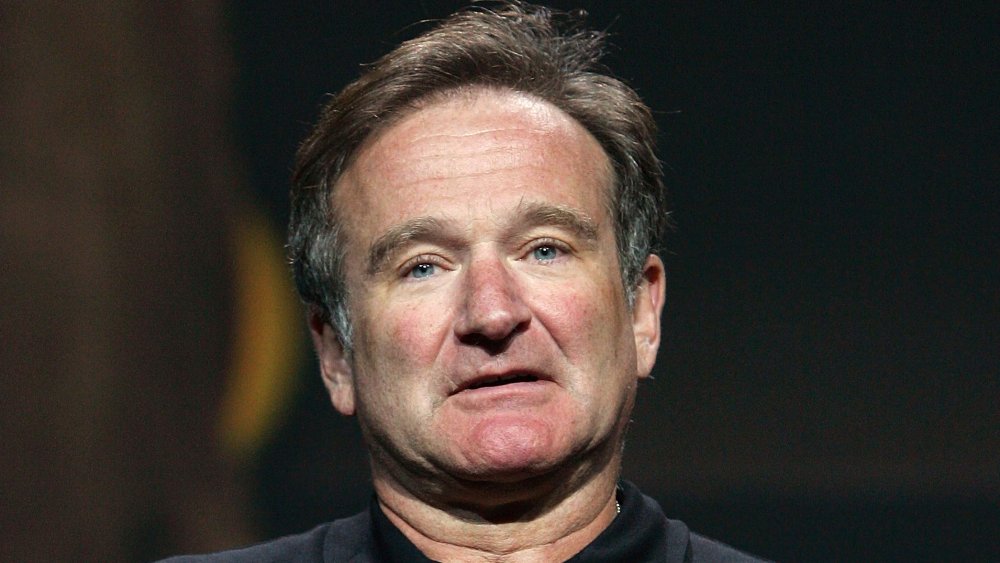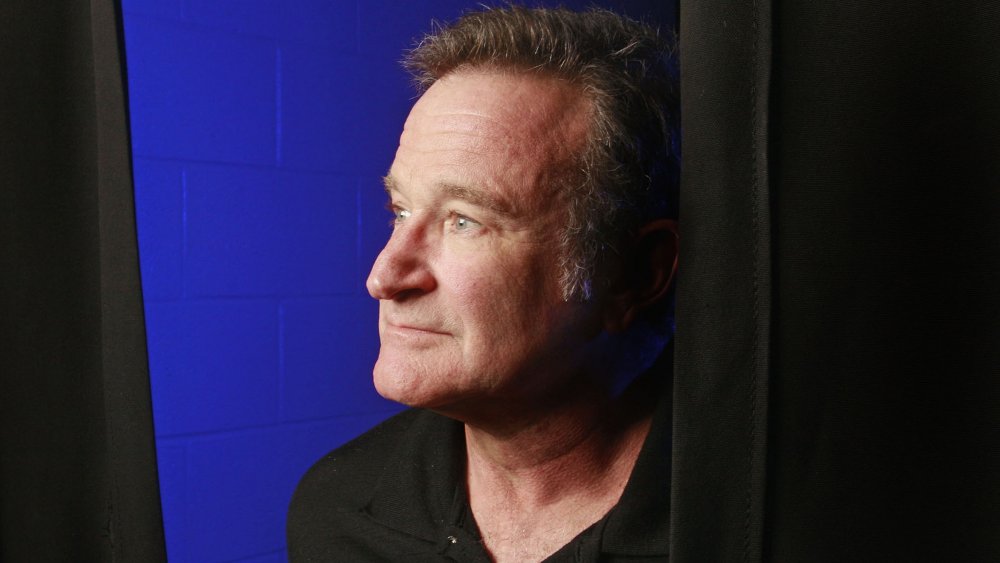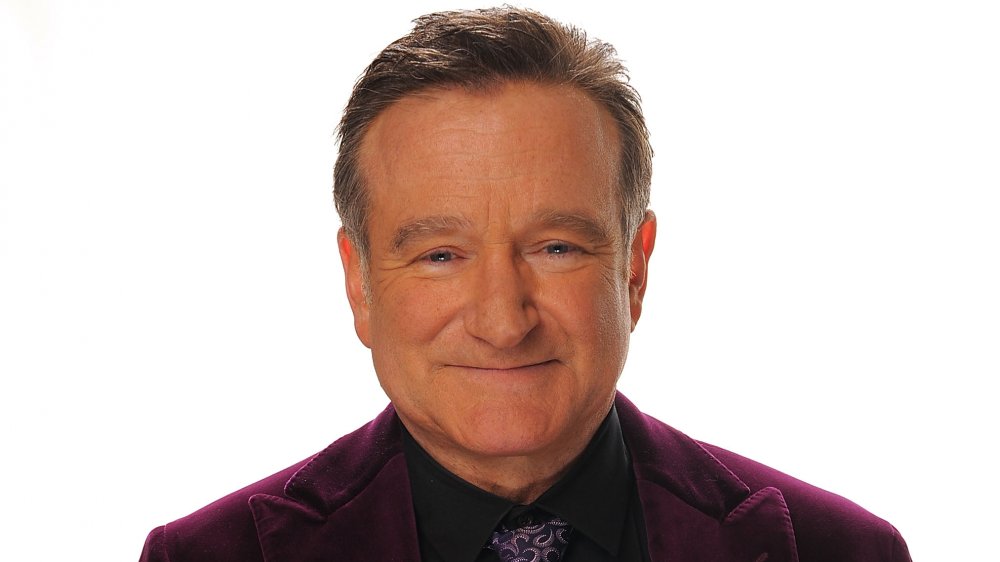Tragic Details About Robin Williams
The following article includes mentions of mental health issues, addiction, sexual misconduct allegations, and suicide.
As one of Hollywood's great tragic figures, Robin Williams inspired generations of film-goers with his beloved roles in movies like Dead Poets Society, Aladdin, Mrs. Doubtfire, Good Will Hunting, Jumanji, and more. The comedian was famous for his hilarious improvisational skills, on-screen depth, and general air of kindness — and peers and fans alike were heartbroken when Williams tragically died of suicide in 2014. The actor left behind a substantial on-screen legacy, as well as three children: daughter Zelda and sons Cody and Zak. His kids have since poignantly remembered their famous dad in the years following his death, with Zak honoring Williams with the name of his son, and Cody getting married on Williams' birthday in 2019.
Williams may have brought smiles to fans' faces in his decades of TV and movie roles, but his off-screen life was sadly complicated and at times destructive. His untimely death at age 63 robbed Tinseltown of one of its all-time greatest talents, and it's difficult not to mourn Williams' death as a premature loss. These are the many demons Robin Williams battled over the course of his challenging life.
If you or someone you know is having suicidal thoughts, please call the National Suicide Prevention Lifeline at 1-800-273-TALK (8255) or text HOME to the Crisis Text Line at 741741.
Robin Williams' parents were absent during his childhood
Born in Chicago in 1951 and later raised in Bloomfield Hills, Michigan, Robin Williams didn't have a stereotypically happy childhood. The comedian was raised by nannies and members of his household's staff and struggled to connect with his parents due to the rigorous travel schedules of his automotive executive father and fashion model mother.
Telling People in 2009 that "the ideal child was seen, not heard," Williams later described how, as a lonely child, he finally connected to his mother through comedy. "I tried to find things to make her laugh," he said in Dave Itzkoff's 2018 biography, Robin, "doing voices or anything that would get a response out of her." That same year, the HBO documentary, Robin Williams: Come Inside My Mind, featured footage of Williams recalling seeing his normally stoic father laughing while watching The Tonight Show with Jonathan Winters, and realizing that telling jokes could help him grow closer to his father. "My dad was a sweet man but not an easy laugh," Williams recalled (via Yahoo! Entertainment). "My dad lost it, and I went, 'Who is this guy who made [my] father laugh?'"
Williams expanded on his relationship with his parents during his 2001 interview on Inside the Actor's Studio. "She was kind of really part of my whole comedy upbringing," he said of his mother, adding of his "elegant and stern" father and isolated childhood, "[He] found this old [gigantic] mansion that he rented ... I kind of just had myself to play with."
He allegedly groped his Mork & Mindy co-star
Robin Williams' starring role on the Mork & Mindy sitcom won the comedian mainstream stardom, playing the lovable alien Mork from the planet Ork. The series premiered in 1978 and co-starred actor Pam Dawber as Mork's human friend-turned-wife, Mindy. But Williams' unique style of improvisational comedy sometimes allegedly crossed the line on-set, as Dawber claimed in Dave Itzkoff's Robin. The biography also recalled inappropriate moments Williams inserted into the show, like allegedly poking a woman's posterior with a cane during a scene.
"I had the grossest things done to me — by him," Dawber alleged, before clarifying that she wasn't bothered by Williams' alleged behavior. "And I never took offense. I mean, I was flashed, humped, bumped, grabbed. I think he probably did it to a lot of people ... But it was so much fun. Somehow he had that magic. Even though, if you put it on paper, you would be appalled ... Somehow he could get away with it."
The series' director, Howard Storm, corroborated Dawber's claims, similarly referring Williams' alleged bad behavior as "just Robin being Robin" whenever he was feeling "bored." Storm explained, "He'd be doing a whole paragraph, and in the middle of it, he would just turn and grab [Dawber's] a**. Or grab a breast. And we'd start again. I'd say, 'Robin, there's nothing in the script that says you grab Pam's a**.' And he'd say, 'Oh, okay.'"
If you or anyone you know has been a victim of sexual assault, help is available. Visit the Rape, Abuse & Incest National Network website or contact RAINN's National Helpline at 1-800-656-HOPE (4673).
Robin Williams dealt with cocaine addiction
Robin Williams openly admitted throughout his career that cocaine was a dangerous vice for him, revealing in Dave Itzkoff's Robin how the drug was part of his life from his early years in comedy. "They give it to you for free," Williams said, adding, "Everyone will pump you up if you're ready, because it also gives them some control over you."
The 2018 biography also detailed how cocaine became part of the actor's regular routine during his Mork & Mindy days. Describing the drug as "like a sedative, a way of pulling back from people and from a world that [he] was afraid of," Williams explained, "I did cocaine so I wouldn't have to talk to anybody."
Williams was also reportedly present during the deadly cocaine binge that took the life of fellow comedian John Belushi in 1982. Shortly after, Williams quit the drug ahead of his son Zak's (pictured above) birth the following year. "The Belushi tragedy was frightening," the Hook star told People in 1988. "... His death scared a whole group of show business people. It caused a big exodus from drugs. And for me there was the baby coming. I knew I couldn't be a father and live that sort of life."
He also struggled with alcoholism
Similarly to his cocaine use, Robin Williams dealt with an addiction to alcohol, and quit drinking when his eldest son, Zak, was born in the early '80s. He would relapse on several occasions, but Williams stayed sober for nearly 20 years, before falling back into drinking in 2003 while filming in Alaska. "I was in a small town ... and then I thought: drinking. I just thought, hey, maybe drinking will help," he told The Guardian in 2010. "Because I felt alone and afraid ... and it was the worst thing in the world. You feel warm and kind of wonderful. And then the next thing you know, it's a problem, and you're isolated."
Following his relapse, the celeb would go to rehab In 2006 after a family intervention. Speaking about his father's struggles with alcohol, Zak Williams told The New York Times in 2009 that "there was an ultimatum attached" to Robin's rehab stint. "There were times when many of us were asking questions, saying, 'Hey, what the hell is going on?'" Zak said. "I'm pretty confident that if he continued drinking, he would not be alive today."
Shortly before his death in August 2014, Robin Williams went back to a rehab facility to maintain his sobriety, with his representative telling HuffPost that July, "After working back-to-back projects, Robin is simply taking the opportunity to fine-tune and focus on his continued commitment, of which he remains extremely proud."
If you or anyone you know is struggling with addiction issues, help is available. Visit the Substance Abuse and Mental Health Services Administration website or contact SAMHSA's National Helpline at 1-800-662-HELP (4357).
Infidelity doomed Robin Williams' first marriage
Robin Williams' skyrocketing fame in the '70s and '80s made him a hot romantic commodity, which eventually doomed his first marriage to Valerie Velardi (pictured above). In a People article written in 1988, the year Williams and Velardi separated, the actor described the turmoil he felt about his infidelities: "For many years, I was addicted to women, as if to a drug. That's over now. But looking back, I find it humiliating. Degrading. I'm ashamed."
That same year, a lawsuit filed by one of Williams' mistresses, Michelle Tish Carter, went public, in which she claimed to have had a two-year relationship with Williams that included him giving her herpes (which he denied in a counter-suit). "Very attractive women throw themselves at men in his position," Velardi told People about Williams. "You'd have to be a saint to resist. Besides, neither of us was prepared for the sudden life shift. But I admit the other women were harder to take after I'd had a child." Velardi is the mother of their son, Zak.
In 1989, Williams' divorce from Velardi was finalized, and that same year, he married Marsha Garces, his nanny-turned-mistress-turned-second wife. Williams and Garces welcomed son Cody and daughter Zelda together before splitting in 2008. The comedian's third marriage to Susan Schneider came in 2011. The two were still together when Williams died in 2014.
Robin Williams allegedly had money issues
Robin Williams appeared in many films in the last two decades of his life — but a good number of them were critically-panned, allegedly keeping up his strenuous professional pace to alleviate money woes. In a 2014 report following Williams' death, sources cited by Radar claimed that the actor had accepted film and TV roles that he didn't enjoy doing solely for the paycheck, including a since-axed sequel to his beloved film, Mrs. Doubtfire.
In a 2013 interview with Parade, Williams opened up about his financial troubles, noting that "the idea of having a steady job [was] appealing" while speaking about his decision to return to TV in the CBS sitcom, The Crazy Ones. "There are bills to pay," Williams simply said. "My life has downsized, in a good way. I'm selling the ranch up in Napa. I just can't afford it anymore." When asked whether he was bankrupted by his two divorces, he admitted that he "lost enough" money over the years. "Divorce is expensive. I used to joke they were going to call it 'all the money,' but they changed it to 'alimony.'" Williams added, "It's ripping your heart out through your wallet. Are things good with my exes? Yes. But do I need that lifestyle? No."
He had depression
According to his representatives, Robin Williams was "battling severe depression" when he died in 2014 (via NBC News). However, the actor had struggled with depression for decades, and even described his challenges in a 2007 interview captured by CNN. "No, I'm not always fun to be around," he said. "And that there is this thing of, yeah, the world sees one thing, and what am I like at home? Different, because I can't always be 'on.'"
Friend and comedian Eric Idle revealed to Entertainment Weekly how he tried to set up a guest appearance from Williams during the final Monty Python reunion show in 2013, a period during which Williams was "going downhill." Idle explained, "He said he could come, but he didn't want to be onstage. I said, 'I totally get that.' Because he was suffering from severe depression ... In the end he said, 'I can't come, I'm sorry, but I love you very much.' We realized afterwards he was saying goodbye."
After Williams' 2014 death, his wife, Susan Schneider Williams, confirmed to People that Williams was indeed struggling with depression at the time of his passing. However, she added, "It was not depression that killed Robin. Depression was one of let's call it 50 symptoms and it was a small one."
If you or someone you know is struggling with mental health, please contact the Crisis Text Line by texting HOME to 741741, call the National Alliance on Mental Illness helpline at 1-800-950-NAMI (6264), or visit the National Institute of Mental Health website.
Robin Williams' painful final year included on-set anguish
Following Robin Williams' death in 2014, more information emerged about the extreme mental decline he experienced in the final months of his life. One of the actor's last on-screen roles was that year's Night at the Museum: Secret of the Tomb, with the film's crew revealing harrowing details of Williams' anguish on set, as he battled mysterious ailments, which doctors at the time believed were linked to Parkinson's disease.
"He was sobbing in my arms at the end of every day," Cheri Minns, a makeup artist for the film, claimed in the 2018 Robin biography by Dave Itzkoff. "It was horrible. Horrible. But I just didn't know ... I said to his people, 'I'm a makeup artist — I don't have this capacity to deal with what's happening to him.'"
Williams' wife, Susan Schneider Williams, described his challenges in a 2016 essay about his final months for Neurology. "During the filming of the movie, Robin was having trouble remembering even one line for his scenes," she wrote. "While just 3 years prior he had played in a full 5-month season of the Broadway production Bengal Tiger at the Baghdad Zoo, often doing two shows a day with hundreds of lines — and not one mistake." Schneider Williams added, "This loss of memory and inability to control his anxiety was devastating to him ... Robin was losing his mind and he was aware of it. Can you imagine the pain he felt as he experienced himself disintegrating?"
The beloved actor died tragically in 2014
The entertainment world was left in shock when Robin Williams was found dead in his home in Tiburon, California on August 11, 2014. His cause of death was ruled to be asphyxia due to suicide by hanging, according to USA Today. "This morning, I lost my husband and my best friend, while the world lost one of its most beloved artists and beautiful human beings," Williams' wife, Susan Schneider Williams, shared in a statement, adding, "I am utterly heartbroken." Williams' daughter, Zelda, also publicly mourned her father's death, writing in a since-deleted tweet (via E!), "I love you. I miss you. I'll try to keep looking up."
As news of Williams' death circulated, his famous friends flooded the Internet with stories of his kindness, with many surprised to learn that he had been sick or suffering. When Schneider Williams later revealed that Williams was believed to be struggling with anxiety, depression, and a recent Parkinson's disease diagnosis at the time of his death, fellow actor Michael J. Fox — who has publicly battled Parkinson's for decades — expressed his surprise and grief on Twitter. "Stunned to learn Robin had PD," Fox tweeted, adding that Williams had supported his organization for Parkinson's research. "Pretty sure his support for our [foundation] predated his diagnosis. A true friend; I wish him peace."
If you or someone you know is having suicidal thoughts, please call the National Suicide Prevention Lifeline at 1-800-273-TALK (8255) or text HOME to the Crisis Text Line at 741741.
Robin Williams' brain disease wasn't diagnosed until after his death
In yet another stunning and sad discovery three months following Robin Williams' death, a November 2014 coroner's report revealed that he had actually been suffering from Lewy body dementia (LBD). According to the Lewy Body Journal, this is a progressive dementia that comprises Parkinson's disease-like physical symptoms, as well as a serious decline in cognitive abilities.
"[The doctors'] reactions were all the same: that Robin's was one of the worst LBD pathologies they had seen and that there was nothing else anyone could have done," Williams' wife, Susan Schneider Williams, wrote in an essay for Neurology in 2016. Noting that her late husband had been diagnosed with Parkinson's in May 2014, she added, "We had an answer ... But somehow I knew Robin was not buying it ... It is apparent to me now that he was most likely keeping the depth of his symptoms to himself."
Tragically, even if Williams had been correctly diagnosed with LBD while he was alive, it would have almost certainly claimed him in the end. He had died by suicide, Schneider Williams continued, following the disease's "intense, confusing, and relatively swift persecution." She added, "Even if we experienced some level of comfort in knowing the name [of the disease], and fleeting hope from temporary comfort with medications, the terrorist was still going to kill him. There is no cure and Robin's steep and rapid decline was assured."
In 2020, Schneider Williams participated in the Robin's Wish documentary to clarify what she called the "many misunderstandings" surrounding Robin Williams' untimely death.

